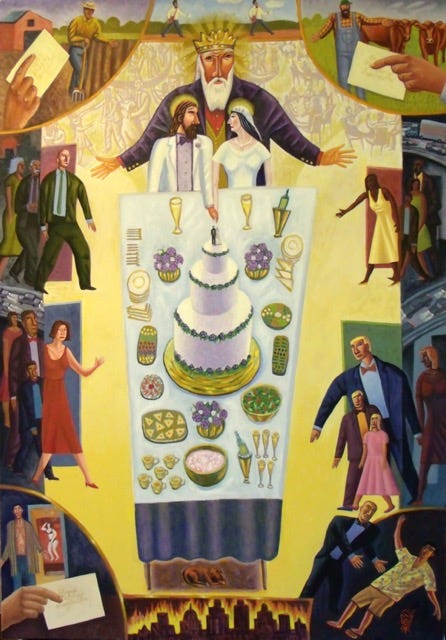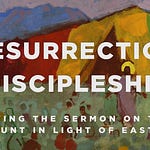As the token pastor in my friend group and family, I am asked to do the religious things people think they s of my family and friends, my ordination and two seminary degrees qualify me for saying the blessing before family meals, providing commentary on the latest Christian malarky that was in the A-section of the Washington Post, and officiating funerals and weddings. Because we are at the tail-end of wedding season, I am officiating two weddings over the next three weeks – one for a couple I have known since beginning my ministry in Arlington and the second for the son of a fraternity brother.
Weddings are part of my gig as a pastor, and, like a typical Arlington overachiever, I will be the best wedding officiant a couple will ever know. We meet no less than three times before the wedding to prepare – premarital counseling, worship planning (because, after all, a wedding is an act of worship), and to finalize any last-minute logistics. The last-minute logistics always include confirming the location of the wedding venue, the date and time of the service, the number of people in the wedding party, who will have the rings before the service begins, which family members the couple wants me to run interference on, if I’m invited to the reception ensuring I am not stuck at the boring table, and what the couple would like me to wear. I do not care one way or the other – suit with no stole, suit with a stole, robe and stole, a tuxedo, or whatever else a couple may ask me to wear. I do not want to show up at the wedding wearing the wrong attire.
Jesus told the Chief Priests and Elders of the temple another parable. This is the third parable in Jesus’s response to their questions about his authority. “Who are you to do what you have been doing? They asked. “You have the audacity to come into ‘our’ temple and shake things up. Just who do you think you are?” they asked.
A king was throwing the most spectacular wedding reception for his son. No expense was spared. The prime rib station and seafood towers were ready to go. The invite list included the who’s who of the country club. There was a VIP entrance at the banquet hall for those who could not use the front door like the other buddies of the king. But the king’s buddies and the VIPs saw the invitation and never showed. They either did not want to attend or had better things to do.
“No problem,” says the king. The king Sends his fixer out with a new set of invitations. “The food and drinks have been paid for. Go and find new guests. Check the Halfway House, 7-Eleven, heck go outside the Beltway if you have to. Come one, come all.”
Sounds like a great party, right? I bet you loved this parable up to this point. We love it when Jesus gets all Jesus-y and makes clear that all are welcome. Come one, come all is the invitation we hear every time we gather around Christ’s table, breaking bread and sharing the cup.
After the king had the first round of guests offed like they were in an episode of The Sopranos, the second round of invited guests showed up to the party. As they walk the red carpet, they are offered wedding clothes that the king had ready for the guests;[i] top-of-the-line stuff. The things you buy at Tyson’s II. After all, there is a dress code at this party. This is not just any black-tie affair.
One guest catches the eye of the king. After he walked the red carpet, after his eyes adjusted to the camera’s bright lights, this guy declined the attendant’s invitation to change his attire.
The guy refused to change his clothes. No expense was spared. A prime rib station, seafood towers, an open bar, the finest clothing in the world, and a free ticket were not enough to convince this guy to change his clothes. He refused to change. And for his refusal to change, the man was cast into darkness.
Again, and somehow, Jesus tells us the Kingdom of Heaven is wrapped up in this mess.
We become uncomfortable when this parable hits verse 13. We could stomach the king’s buddies and the VIPs being offed. We loved hearing that all were invited to the party. Why couldn’t Jesus just leave the parable there?
There was a king who threw a huge party. The original guests couldn’t be bothered, so the king invited the outcast and those his buddies would never dream of spending time with. The new guests arrived and partied like rock stars. Such is the Kingdom of Heaven – the end.
We would love that parable.
I have said this a few times over the past few weeks: when reading Jesus’s parables, we must remember that the parables serve as a window through which we can see the world apart from ourselves. The Parable of the Wedding Banquet is a parable through which we get a glimpse into the Kingdom of Heaven, and when we look closely enough, the light of God’s grace catches the edge of the window we see ourselves in the parable.

Aside from the couple, the cast at a wedding varies from wedding to wedding. There are parents, friends, photographers, caterers, officiant, DJs, family, extended family, the wedding party, valets, wedding crashers, and more. Each has a unique relationship to the couple and role at the wedding. Some are service providers there to collect a check and a few tips. Others are there to celebrate the joining of the couple and their families. There are friends from college who are more excited about the open bar than they are about the actual wedding. There will be guests who underdress for the occasion and those who overdress.
The parables Jesus told do not have morals attached to them. Jesus never finishes one of his parables, saying, “Now the moral of the story is…” If there were a moral to this or any other parable told by Jesus, the subject of the parable would change. Jesus began his parables by saying, “The Kingdom of God,” “the Kingdom of Heaven,” or “the Grace of God is like.”
Like a Samaritan.
Like a lost sheep.
Like a lost coin.
Like two sons.
Like a vineyard owner.

If we are looking through a window and only catching a glimpse of ourselves, then the parables are not about us. No matter how hard we try, no matter the theological backflips we are willing to do, we are not the subject of the parables. If we ever read one of Jesus’s parables and find ourselves as the story's hero, we had best reconsider what Jesus said.
No, the parables are about God. That’s why, in this parable, the only person who speaks is the king. Even the guy confronted in verse 12 for not wearing a robe has no line in this parable. The king “said to him, ‘Friend, how did you get in without a wedding robe?’ And he was speechless.”[ii]
The Kingdom of Heaven is like a king giving his son a wedding banquet. The Kingdom of Heaven is like God, who throws a party for the Son.
We, the baptized, Christ’s body, Christ’s bride, the church are not mentioned by name in this parable. We are so convinced that we need to work out our salvation that we turn grace into law and place ourselves in the parable when we are not yet there.
The Priests and the Elders wanted to know who Jesus was. They wanted to know what his relationship was with God. Jesus is telling them about himself, not us.
So where are we? We are not yet in this parable. We are waiting in the Barnett Room. We are in the parlor. We are with our overbearing soon-to-be mother-in-law, friends from college, and family preparing for the wedding.
In reality, this parable of judgment is a parable of grace because it is not a story about getting your things together and sitting down at the banquet table wearing your best. Instead, this is a parable about the lengths to which God will have every last detail of the wedding banquet perfect, nothing out of place – the silver is polished, and every guest is in their place – to celebrate the marriage of the Son.
To you. To us.
Jesus assumes we know this because he’s already said it.
He has assured his disciples that there is a place prepared for us. He uses the same language in this parable to ensure the banquet is prepared.
The end of the Book of Revelation makes clear (as clear as Revelation can be) that at the end, “the marriage supper of the Lamb has been made already.”[iii] Christ will return, coming back to the church that is prepared. Prepared as a bride awaiting the bridegroom. Prepared as two people who are prepared to be united as one.
So, here’s some Good News.
You are not any of the people you thought you were in this parable.
You are not the king who throws caution to the wind and spares no expense.
You are not the one too busy to find time to attend the party.
You are not the guy who refused to change his clothing.
You may think you are any number of characters in this parable throughout your life. The world will tell you that you must do this or that to be worthy. But (and because it’s a big, but you know it does not lie) because of your baptism, because you have been clothed in Christ’s righteousness, you are already wearing the correct clothing, you are free to do the things that Jesus did and to lay your worry about the little you feel that you do or the things you leave undone aside. And there lies the heart of the king’s invitation. In the Kingdom of Heaven, we lay aside our efforts at righteousness through repentance and baptism and put on the righteousness of Christ.
For better or worse, in sickness and in health, you are Christs. Let what God has joined together let no one tear asunder.
[i] In Parables of the Kingdom, the late Rev. Robert Capon suggests that the king had clothing at the ready for his guests. The king knew, Capon argues, that the guests would not be clothed in what was necessary for the event.
[ii] Matthew 22:12
[iii] Revelation 19:6-9

















Share this post